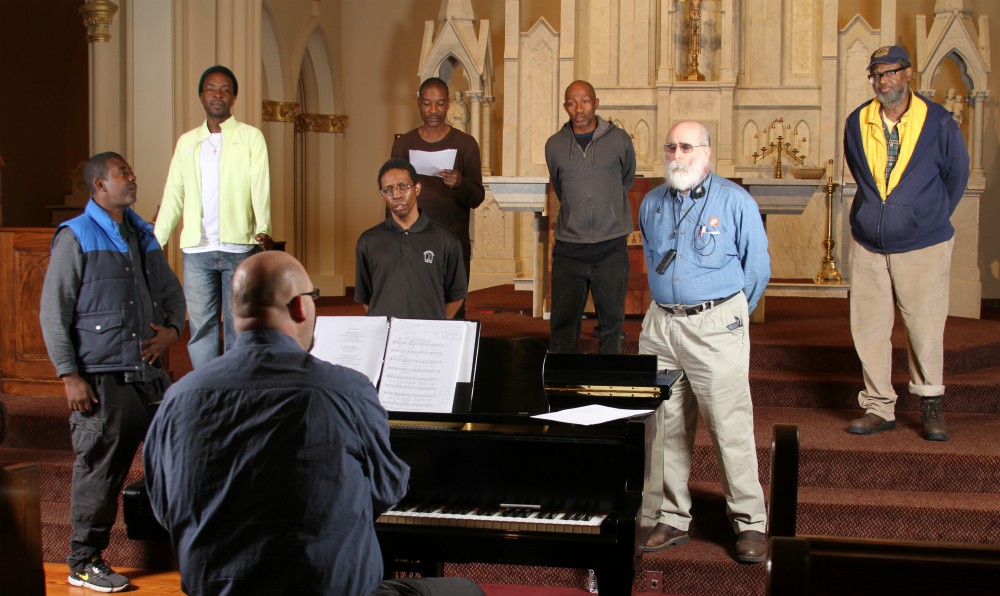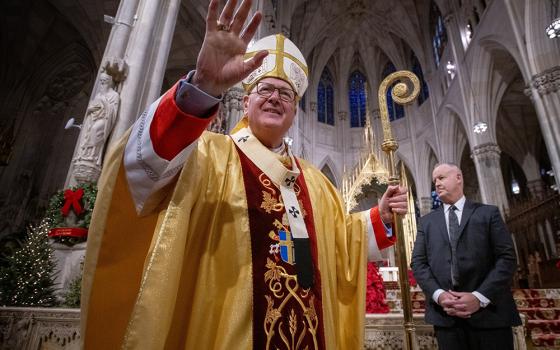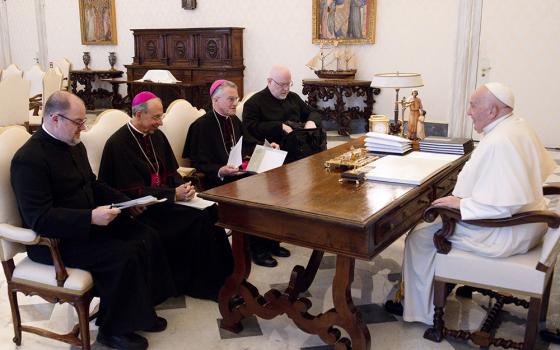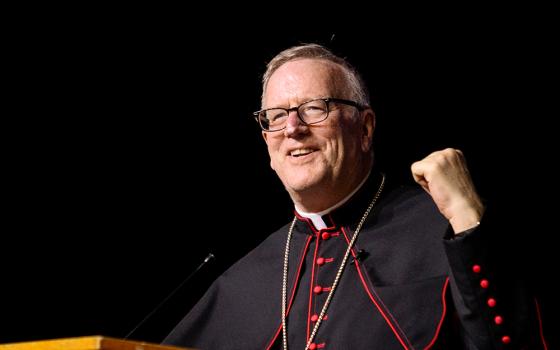
Music director Dónal Noonan leads a rehearsal with Homeward Choir members in February 2014. (Georgia Bulletin Photo by Michael Alexander)
In the heart of downtown Atlanta stands the Shrine of the Immaculate Conception. Save for the damage rendered by a few wayward shells between Union and Confederate forces during the Civil War, the Shrine — and its community — has remained upright and intact for almost two centuries.
In the early 1980s, the Shrine, in conjunction with the nearby Central Presbyterian Church, formed the volunteer-run Night Shelter, which, to this day, houses over 100 homeless men every night between the months of November and April. It was from this ministry that the Atlanta Homeward Choir came to be.
Dónal Noonan founded the choir six years ago.
"[The Night Shelter] truly is a living testament to the working Gospel," he said, "and I wanted to offer the refuge of music to the residents within the walls of the Shrine."
From its humble beginnings as a bi-weekly meeting of seven shelter residents, the choir eventually grew in popularity: in any given year, it boasts close to 20 performers.
A native of County Kildare, Ireland, Noonan first arrived in Atlanta in 2012. In his daily commutes, he encountered many of Atlanta's 3,000 homeless people. "I was disturbed," he said, "by the monotony of the lives of the people I saw on the street." So, he sought to do something about it.
"Music is a vessel that brings people closer to God, with the power to unite singers and listeners alike," he said. "I wanted to offer that to the shelter's residents, treat them as individuals, and inspire them to want to improve their situations."
Noonan now seeks to awaken the housed, or those who are not homeless, in a similar way.
"The choir's mission is to empower the homeless through the beauty of music and to call the housed to action," he said, adding, "I don't prefer to call them 'the homeless.' I prefer to call them people who are 'afflicted with homelessness.' Because many of them do not choose this life. And many of us have factors beyond our control that can put us on the streets in one or two paychecks."
A central impetus in creating the choir was to convey this reality to those who attended concerts.
"I want the housed to look at the choir and see a mirror — to see themselves in [the choirmen's] faces," Noonan said.
Chris Rosse, the choir's logistics director of four years, contributes to its mission from behind the scenes. Admitting that he lacks musical inclination, Rosse instead diverts his energies toward assisting the choirmen in their search for housing and employment.
The choir works intimately with Project Community Connections, Inc., a non-profit that aims to locate affordable, permanent housing for Atlanta's homeless. Rosse's goal is to provide Project Community Connections, Inc. with various candidates for housing from the choir by the time March, the conclusion of the choir's five-month season, rolls around.
But hard work starts in the many months before spring comes: ensuring that each choirman acquires a supportive community, a sense of self-sufficiency and self-actualization, and a repertoire of essential life skills, such as doing laundry or cooking.
"It's such a thrill to see success starting to happen in their individual lives" Rosse said. "There is nothing more rewarding than hearing the jingle of keys in [an ex-choirman's] hands," which indicates that he has, at last, leased an apartment.
Advertisement
But some of the ex-choirmen are not so lucky, as the choir's resources and capacities can only stretch so far.
"The hardest part of this ministry is leaving someone behind," Noonan said. "There are people who need so much help that you just cannot give. We wish we could wave a magic wand and acquire those resources, but we sometimes just can't."
Rosse agreed. "It is sad and hard to lose track of [ex-choirmen] who have returned to Atlanta's streets."
Even still, the choir has known victories. In 2015, the choir garnered the attention and support of Rep. John Lewis (D-Georgia), which secured an opportunity to perform in the White House's Holiday Open House Celebration.
Additionally, the nascent Women's Choir, now in its second year, recruits singers from City of Refuge, which provides women in need with temporary housing, counseling and workshops. Noonan even dreams of performing at the Vatican someday.
Before they reach Rome, however, they will travel 700 miles northward to sing. Harmony, Hope, and Healing, also Catholic in its origins and mission, brings musical workshops and programs to Chicagoans of all genders and ages who have been traumatized by homelessness, addiction or incarceration. Noonan encountered some of the organization's leadership in Dallas at a summit for "street choir" directors, and they were inspired to coordinate a combined performance.
"We flipped a coin," Noonan said, "and that's how we determined whose choir would get on a plane."
The Homeward Choir will travel to Chicago to perform in December at the Daley Center. While there, they plan to attend the annual Homeless Memorial Service at Old Saint Pat's Catholic Church.
"[The point of the service] is to remember those who have been lost to homelessness, both named and unnamed," Noonan explains, "and to encourage our leaders to address this issue."
Noonan's efforts to place those afflicted with homelessness behind a microphone have secured for many ex-choirmen lives of security, dignity and safety — often for the first time.
"I love running into [an ex-choirman] on the street and finding that he has made the best possible life for himself by securing work and housing," he said. "That they accredit this to the work of the choir — and knowing that we have made such a huge impact — is the most rewarding part of this work."
[Franchesca Alamo is a graduate of the University of Chicago, substitute teacher and catechist in Houston, Texas, who plans to matriculate at law school in the fall of 2019. While not working or volunteering with her parish, she can be found thumbing through feminist theology, in the front row of a local poetry reading or walking her Boston Terrier.]







